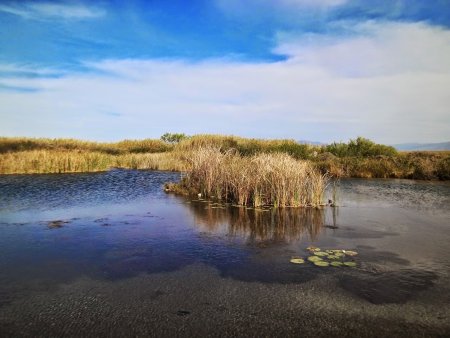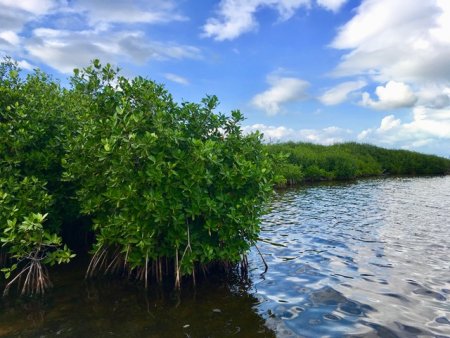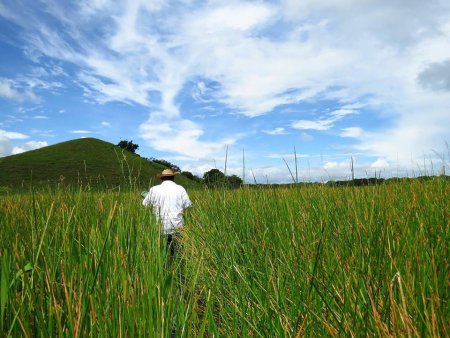Mexico’s environmental sector celebrated World Wetlands Day

The National Commission for Protected Natural Areas (Comisión Nacional de Áreas Naturales Protegidas, CONANP) presented the Climate Change Adaptation Programme for the Marismas Nacionales region. The Programme recognises the value of the wetlands and proposes specific actions for their conservation.
The Minister of the Environment and Natural Resources, Rafael Pacchiano Alamán, presided over the celebration of World Wetlands Day in the Marismas Nacionales Biosphere Reserve, Nayarit, where the Region’s Climate Change Adaptation Programme (Programa de Adaptación al Cambio Climático, PACC) was presented, which is designed to provide information and tools for dealing with the possible impacts of this phenomenon.
The head of Mexico’s Ministry of the Environment and Natural Resources (Secretaría de Medio Ambiente y Recursos, SEMARNAT) was accompanied by the Governor of the State of Nayarit, Roberto Sandoval Castañeda; the Senior Official, Jorge Carlos Hurtado Valdez, the National Commissioner for Protected Natural Areas, Alejandro Del Mazo Maza; the Director General of the National Forestry Commission, Jorge Rescala Pérez, the Ministry of Rural Development and the Environment of Nayarit, Juan Manuel Rocha Piedra, the Municipal President of Santiago Ixcuintla, Fátima del Sol Gómez Montero, and Víctor Hugo Vázquez Morán, Director of the Marismas Nacionales Biosphere Reserve.
Also present were the Local Member, Any Marylu Porras Baylon; the Local Member, Benigno Ramírez Espinoza; the SEMARNAT Delegate in Nayarit, Omar Camarena González; the Director of the Western and Central Pacific Region of CONANP, Humberto Reyes Gómez; and the Head of Engineering and Bi-national Water Affairs for CONAGUA, Alfredo Ocón Gutiérrez.
The head of SEMARNAT pointed out that in October last year the Mexican Government transferred 32.3 million pesos to this body, for the recovery of its mangrove forests, an investment that formed part of a far larger resource earmarked for the conservation of wetlands in Mexico.

The Municipal President Fátima del Sol, meanwhile, recognised the importance of programmes run by CONANP, PET and PROCODES, for caring for wetlands and the welfare of the people, and she thanked the federal ministers and the Governor for their visit.
The National Commissioner stressed that one of the main threats are extreme natural events, which are becoming increasingly frequent as a result of climate change.
The Marismas Nacionales region in the States of Nayarit and Sinaloa has been identified as an area that is particularly vulnerable to this phenomenon. Therefore, CONANP has promoted the development of an Adaptation Programme to reduce the vulnerability of the ecosystems and communities that depend on the latter.
The Programme was prepared in collaboration with The Nature Conservancy (TNC) and Conselva, Costas y Comunidades A.C., with support from The David and Lucile Packard Foundation, the German Society for International Cooperation (GIZ), the CONANP-UNDP Synergy Project, the GEF ‘Coastal Watershed Conservation in a Context of Climate Change’ Project (C6) and the Hemsley Charitable Trust.
Finally, the National Commissioner welcomed the coordination and synergy between CONANP, CONAFOR, PROFEPA, the Mexican Government, as well as civil society organisations, thanks to which significant results have been obtained in hydrological restoration and reforestation with mangroves, as well as in the preparation of a risk atlas and studies to estimate the carbon sequestration rate, in addition to many other initiatives.

Moreover, during the event, the participation of civil society and academia was recognised in the development of the “Adaptation of coastal ecosystems to climate change in Mexican Protected Natural Areas, with an emphasis on the capture and reduction of carbon emissions in wetlands" project implemented by the organisation Natural Spaces and Sustainable Development (Espacios Naturales y Desarrollo Sustentable, AC [ENDESU]), in coordination with CONANP and financed by the Climate Change Fund. This project is very innovative, since it attempts to reduce the vulnerability of ecosystems through the implementation of actions outlined in the PACC.
Finally, the Governor of the State of Nayarit recognised the hard work put into the conservation actions carried out by SEMARNAT through its ministerial departments, since it is necessary to be united in the face of a difficult economic context. He pointed out that a country’s wealth is its biodiversity and that it is important to strive for a healthy environment in order to improve living conditions. He stressed that, without the marshes, there would be no scallops or shrimps in this Region.
The most moving message was from the children at the Valentín Gómez Farías primary school in Boca de Camichín. They performed a play on the importance of wetlands for migratory birds and all the other species found in the area.
Marismas Nacionales was designated a Ramsar Wetland of International Importance in 1995, and a large percentage of the part of the Site located in the State of Nayarit was declared a Biosphere Reserve on 12 May 2010, with a total surface area of 133, 854 hectares.
The festivities took place on the Toro Mocho common land, near the town of Boca de Camichín, in the municipality of Santiago Ixcuintla. This location is situated in the estuary of the San Pedro Mezquital River, one of the main rivers that flow into the Marismas Nacionales. The region represents a vast complex of coastal lagoons, mangroves, marshes and forests and contains the largest mangrove forest in Mexico.